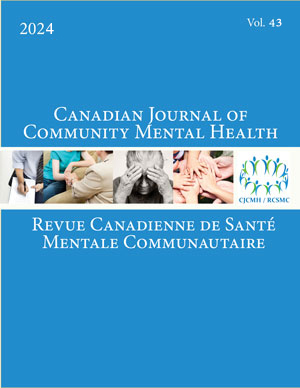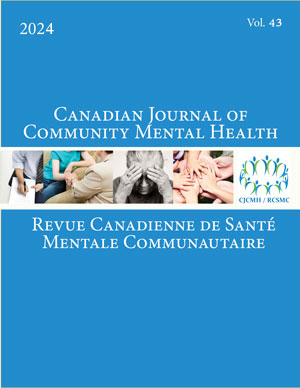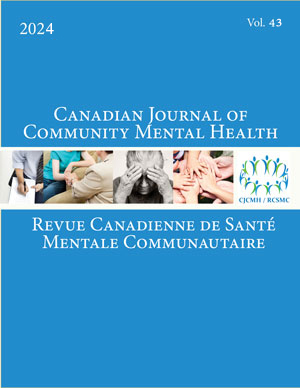Volume 2 • Number 1 • April 1983
OPEN ACCESS
This paper is a response to the British Columbia mental health planning report's position on primary prevention. The report adopts the position of Lamb and Zusman (1979) that research and service aimed at primary prevention should not be funded with money allocated for mental health, and arguments are presented to support this viewpoint. This paper critically reviews the ideological underpinnings, the research base, and the action implications of these arguments, and provides another paradigm for mental health policy in Canada. It is proposed that a spirit of open inquiry is needed so that alternative paradigms can be explored and innovations in both rehabilitation and primary prevention can be allowed to develop.
OPEN ACCESS
Ever since the research of Goffman (1961) the lot of the former mental patient has been of special import. Unfortunately, several aftereffects of mental hospitalization may occur, in which the disposition of the general public toward the ex-patient may be prejudiced, and, possibly, discriminatory. Except for that of Farina and colleagues, relatively little research has studied these aftereffects. Using a method developed by Page (1977), the present studies investigated a unique aspect of these, namely, problems experienced in obtaining accommodation. Persons identified as former patients experienced significantly greater difficulty in obtaining accommodation that when no such information was given. Comparisons are made with other types of stigma, involving speech impediments, and results are discussed in light of recent work by Farina and others.
OPEN ACCESS
The author proposes a new model of community participation based on the social exchange theory of Thibault and Kelly. The model emphasizes the satisfactory balance between costs and benefits for both grass root citizens (or the members) and the managers (or the leaders). As participation is conceived in terms of means to fulfill psychological needs, the article presents a tool to identify correctly those different needs of both members and leaders. Knowing those psychological dynamics could be helpful in developing adequate strategies to promote citizen participation.
OPEN ACCESS
The relationship between life events and symptoms during a six month period following discharge was examined for four diagnostic subgroups of psychiatric patients (N = 505). The significant correlation between total life changes and symptoms disappeared when health related items were deleted. These events should be kept analytically distinct to avoid operational confounding. There was a correlation between undesirable life events and symptoms specific to the diagnostic subgroups characterized by depression. Although the correlations between life event scores and symptoms were weak or non-existent, there are strong correlations between social adjustment scores and symptoms. One explanation is that the most potent stressors are the ongoing difficulties rather than major changes which occur. It is suggested that the ongoing difficulties are, in part, a reflection of inadequate coping skills and a lack of social support: factors which may have a direct negative effect on symptoms and increase vulnerability to minor stressors.
OPEN ACCESS
As increasing numbers of mentally retarded people move from institutions to community living, adequate provision must be made for some form of legal guardianship. Existing guardianship laws have been criticized for being inflexible and for emphasizing property management at the expense of personal support. The guardian's crucial role should be to promote the best interests of the retarded individual while also respecting his/her personal preferences. Principles to guide guardian decision-making are discussed in this context, including issues of values and priorities. Some of the reforms necessary to achieve a balanced guardianship program include the development of clearly defined guidelines for imposition of guardianship; provision for guardian accountability, and basic procedural fairness.
OPEN ACCESS
Based on a review of the literature, this article presents different elements one must be sensitive to when entering into a counselling relationship with individuals who do not share North American cultural heritage and values. More specifically, the authors review ten factors and attitudes which they believe have a significant impact on the counselling process and outcome. In addition, the article recommends training areas for professional counsellors planning to provide counselling services to ethnics and minorities. Finally, the article stresses that providing services to cultural and minority groups is a complicated and involved process. Not only is it necessary to provide services in the language of the clients but it is also essential to examine and possibly change counsellor attitudes and behavior in order to provide efficient counselling services.
OPEN ACCESS
This study examines the various solutions for loneliness and social isolation with the elderly who live outside of an institution. The sample consisted of senior citizens and volunteers who were randomly selected from a community day centre. Specifically, the study examines the effects of the relationship on the volunteer, the senior citizen and on their interactive process. The volunteers were divided into two intervention groups. One control intervention group played the role of the “friendly visitor” which consisted of visiting the senior citizen of their residence and interacting in an informal manner. The other group, the experimental intervention group consisted of volunteers who served as a “short-term link” between the elderly and the possible social community resources available to them. The volunteers motivational levels were examined as a function of which group they belonged to. The degree of loneliness and social isolation for the elderly were examined as a function of what kind of intervention they received. The results appear to demonstrate that the volunteers in the control group have 1) a higher degree of egocentrism and activity than the experimental group; 2) a lower level of altruism than the experimental group. For the elderly, the results seem to indicate that the degree of loneliness and social isolation substantially decreased when the elderly are visited by the volunteer belonged to the experimental intervention group. From these results, one can readily ascertain that the helping relationship of the short-term link nature lead to a more successful type of intervention for the elderly sample in this study. Implications and the importance of the role of the community psychologist are discussed as a function of the differences and similarities between the volunteers and the elderly respectively.
OPEN ACCESS
Excessive stress is cited increasingly as a leading contributor to public health problems (Lalonde, 1974; U.S. Surgeon-General, 1980). In the fall of 1979 the Western Center for Preventive and Behavioral Medicine surveyed staff of community health settings in B.C. about current knowledge, attitudes and practices with regard to stress and its management. Respondents (n = 337), who included community health nurses, physicians, psychologists, social workers, psychiatrist, and administrative-clerical staff, were asked about both their current and desired stress management practices, perceived barriers to practice, and their interest in follow-up education and research. Data were analyzed for these issues as well as by professional group and by type of community health setting, i.e. public vs. mental health. The results indicate a strong interest in both practice and further training in stress management by all Community Health groups, with greatest interest shown among community health nurses in public health settings. The survey provided support for the Western Center's efforts to develop, disseminate and evaluate clinical stress management materials for both public and private health practitioners.
OPEN ACCESS
The following address was delivered at the 43rd annual convention of the Canadian Psychological Association, on June 11, 1982, in Montreal, Quebec. Distinctions between community psychology and community mental health were set forth as focal point for a needed clarification of distinctions between clinical and community psychology, between academics and practitioners. Values underlying the interaction of the community and the professional were highlighted. Attention was drawn to the need for operational definitions of concepts currently used by community psychologists, and for the specific study of the historical antecedents within a Canadian context.










